综合英语第一册unit1 Never say goodbye
综合教程Unit-1-Never-Say-Goodbye(1)

ever say goodbye”? How did the author come to realize the essence of his
grandfather’s words? Are there any sentences that you remember clearly
and can repeat soon after you read the text?
SFS, SCNU
Main idea 1. What is the story narrated in the text about?
SFS, SCNU
2. Based on the time phrases found above, divide the
text into parts by completing the table.
Time paragraph(s)
Event
when I was
1
ten,
When the
final day
Para. 14-20: grandpa’s death and “my” realization
Where was the deathbed placed? Why was it placed there? What SFS, SCNUis it that “I knew” at last?
(I) “My” situation and anguish
SFS, SCNU
综合教程(上外)第一册翻译

UNIT 1 NEVER SAY GOODBYE1.他对这次面试中可能提到的问题作好了答案。
2.He has prepared answers to the questions that he expects to confront in the interview.3.他悲惨的遭遇深深打动了我们,使我们几乎哭出声来。
4.His sad story touched us so deeply that we nearly cried.5.他们俩手挽着手沿着河边散步,有说有笑。
6.They two are walking hand in hand along the river bank, chating and laughing happily.7.听到这令人激动的消息之后,他眼睛里涌出欢乐的泪水。
8.When he heard the exciting news, tears of joy welled up in his eyes.9.上海人容易听懂苏州话,因为上海话和苏州话有许多共同之处。
10.People from Shanghai can understand Suzhou dialect easily, for Shanghai dialect and Suzhou dialect have much incommon.11.亨利和妻子正在考虑能不能在3年内买一幢新房子。
12.Henry and his wife are looking into the possibility of buying a new house within 3 years.13.女儿再三请求到国外去深造,他最终让步了。
14.He finally gave in to his daughter’s repeated request to further her education abroad.15.我们在动身去度假前把所有的贵重物品都锁好了。
综合英语1Never Say Goodbye

When will you say goodbye?
• • • • • Lover‗s departure Friends‘ leaving Family‘s passing away Being away from hometown Your past/history
Ways of saying goodbye
Inspiration
• Life is full of turns where we need to say goodbye, and goodbye is always a sad word. But do you still remember our first “hello”, and the beautiful moments that we shared together? • Let the fruits of joys grow during the departure, my friends, till the next time we meet.
• goodbye/bye • see you • later/catch you later/around ( see again soon, for young) • so long ( do not meet again for long time)• have a nice day/good weekend/great time etc • have a good one( good wish) • take care • take it easy (for friends, family member) • nice to meet you/nice meeting you (for friends met for the first time)
综合英语第一册电子课件

Questions:
1. How long had the author lived in that big old house?
2. How did the author like the family life of four generations living together?
While-reading activities
Read through the text and divide the text into three parts and work out the main idea of each part.
While reading, you may have to think over the following questions:
3. Finish the exercises from page 6 to page 9.
Detailed reading
Part One: (Paragraphs 1-4)
Bringing up the problem the author was confronted with: it is hard to overcome the sadness as the moment of parting drew near. So he turned to his grandpa for help.
1. What type of writing is this essay, a piece of narration, argumentation, description or explanation?
大一综合英语unit 1
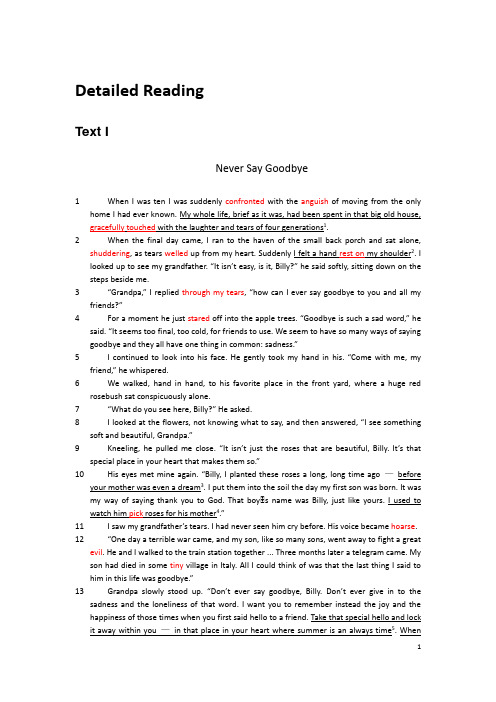
Detailed ReadingText INever Say Goodbye1When I was ten I was suddenly confronted with the anguish of moving from the only home I had ever known. My whole life, brief as it was, had been spent in that big old house, gracefully touched with the laughter and tears of four generations1.2When the final day came, I ran to the haven of the small back porch and sat alone, shuddering, as tears welled up from my heart. Suddenly I felt a hand rest on my shoulder2. I looked up to see my grandfather. “It isn’t easy, is it, Billy?” he said softly, sitting down on the steps beside me.3“Grandpa,” I replied through my tears, “how can I ever say goodbye to you and all my friends?”4For a moment he just stared off into the apple tr ees. “Goodbye is such a sad word,” he said. “It seems too final, too cold, for friends to use. We seem to have so many ways of saying goodbye and they all have one thing in common: sadness.”5I continued to look into his face. He gently took my hand in his. “Come with me, my friend,” he whispered.6We walked, hand in hand, to his favorite place in the front yard, where a huge red rosebush sat conspicuously alone.7“What do you see here,Billy?” He asked.8I looked at the flowers, not knowing what to say, and then answered, “I see something soft and beautiful, Grandpa.”9Kneeling, he pulled me close. “It isn’t just the roses that are beautiful, Billy. It’s that special place in your heart that makes them so.”10His eyes met mine again. “Billy, I planted these roses a long, long time ago —before your mother was even a dream3. I put them into the soil the day my first son was born. It was my way of saying thank you to God. That boy s name was Billy, just like yours. I used to watch him pick roses for his mother4.”11I saw my grandfather’s tears. I had never seen him cry before. His voice became hoarse. 12“One day a terrible war came, and my son, like so many sons, went away to fight a great evil. He and I walked to the train station together ... Three months later a telegram came. My son had died in some tiny village in Italy. All I could think of was that the last thing I said to him in this life was goodbye.”13Grandpa slowly stood up. “Don’t ever say goodbye, Billy. Don’t ever give in to the sadness and the loneliness of that word. I want you to remember instead the joy and the happiness of those times when you first said hello to a friend. Take that special hello and lock it away within you —in that place in your heart where summer is an always time5. Whenyou and your friends must part, I want you to reach deep within you and bring back that first hello.”14 A year and half later, my grandfather became gravely ill. When he returned from severalweeks in the hospital, he wanted his bed next to the window, where he could see his beloved rosebush.15Then the family was summoned and I returned to the old house. It was decided that the oldest grandchildren would be allowed to say their goodbyes.16When it came to my turn, I noted how tired he looked. His eyes were closed and his breathing was slow and hard.17I took his hand as gently as he had once taken mine.18“Hello, Grandpa,” I whispered. His eyes slowly opened.19“Hello, my friend,” he said, with a brief smile. His eyes clos ed again and I moved on.20I was standing by his rosebush when an uncle came to tell me that my grandfather had died. Remembering Grandpa's words, I reached deep within me for those special feelings that had made up our friendship6. Suddenly, and truly, I knew what he had meant about never saying goodbye — about refusing to give in to the sadness.Words and Expressions1. confront: vt.1) be faced with and have to deal withe.g. The actress was confronted by a large group of reporters as she left the stage door.Whenever we are confronted with any difficulties, we shouldn’t give up what we are doing.2) force to deal with or accept the truths of; bring face to face withe.g. When the police confronted her with the evidence, she confessed she was guilty. Collocations:be confronted withconfront sb. with sth.Synonyms:encounter, face2.anguish: n. very great pain and suffering, esp. of the minde.g.Lear, a broken, confused old man, died in anguish.李尔王,这位身心交瘁、精神恍惚的老人在痛苦中死去。
综合英语教程Unit1-Never-Say-Goodbye讲解学习

❖Whose point of view does the story take? What are its advantages and disadvantages?
❖Advantages: A first-person narrative may be more vivid and lifelike, because it gives the reader the impression that it is what the writer himself has seen or experienced.
Remember that special hello and keep it to yourself so that you will be
always filled with eh joy and happiness of summer.
Possible translation
记住那个特别的问候,把它保存在心里, 这样你的内心就永远充满夏天的快乐和幸福。 当你和朋友们必须分离时,我想让你在内心 深处重新找回第一次的问候。
❖When: when the author was between 10 to 12 years old
❖Where: in the author’s big old house ❖Who: the author, his grandfather ❖What: The author was to leave his big old house. His
3. His eyes met mine again. Billy, I planted these roses a long, long time ago before your mother was even a dream.
综合教程 Unit 1 Never Say Goodbye
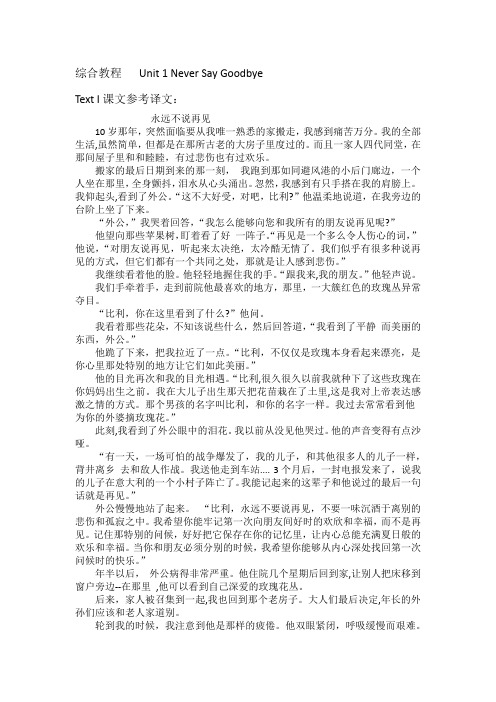
综合教程Unit 1 Never Say GoodbyeText I课文参考译文:永远不说再见10岁那年,突然面临要从我唯一熟悉的家搬走,我感到痛苦万分。
我的全部生活,虽然简单,但都是在那所古老的大房子里度过的。
而且一家人四代同堂,在那间屋子里和和睦睦,有过悲伤也有过欢乐。
搬家的最后日期到来的那一刻,我跑到那如同避风港的小后门廊边,一个人坐在那里,全身颤抖,泪水从心头涌出。
忽然,我感到有只手搭在我的肩膀上。
我仰起头,看到了外公。
“这不大好受,对吧,比利?”他温柔地说道,在我旁边的台阶上坐了下来。
“外公,”我哭着回答,“我怎么能够向您和我所有的朋友说再见呢?”他望向那些苹果树,盯着看了好一阵子。
“再见是一个多么令人伤心的词,”他说,“对朋友说再见,听起来太决绝,太冷酷无情了。
我们似乎有很多种说再见的方式,但它们都有一个共同之处,那就是让人感到悲伤。
”我继续看着他的脸。
他轻轻地握住我的手。
“跟我来,我的朋友。
”他轻声说。
我们手牵着手,走到前院他最喜欢的地方,那里,一大簇红色的玫瑰丛异常夺目。
“比利,你在这里看到了什么?”他问。
我看着那些花朵,不知该说些什么,然后回答道,“我看到了平静而美丽的东西,外公。
”他跪了下来,把我拉近了一点。
“比利,不仅仅是玫瑰本身看起来漂亮,是你心里那处特别的地方让它们如此美丽。
”他的目光再次和我的目光相遇。
“比利,很久很久以前我就种下了这些玫瑰在你妈妈出生之前。
我在大儿子出生那天把花苗栽在了土里,这是我对上帝表达感激之情的方式。
那个男孩的名字叫比利,和你的名字一样。
我过去常常看到他为你的外婆摘玫瑰花。
”此刻,我看到了外公眼中的泪花。
我以前从没见他哭过。
他的声音变得有点沙哑。
“有一天,一场可怕的战争爆发了,我的儿子,和其他很多人的儿子一样,背井离乡去和敌人作战。
我送他走到车站.... 3个月后,一封电报发来了,说我的儿子在意大利的一个小村子阵亡了。
我能记起来的这辈子和他说过的最后一句话就是再见。
新世纪综合教程Unit 1 Never Say Goodbye-完整答案+详细解释
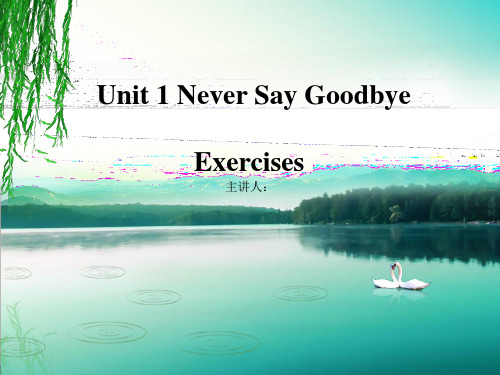
Vocabulary 2
• 1. instead • 2. Confronted with • 3. lock away • 4. welled up
• 5. summon • 6. brief • 7. stared • 8. whispering • 9.evil • 10.give in
Vocabulary 3
• 1-8. D B B B A D B C
Vocabulary 5
• 1. pain, grief, sorrow, agony • 2. loudly, harshly, roughly • 3. sorrow, grief, dismay • 4. inconspicuously, unnoticeably • 5. small, little • 6. meet, join, unite, gather • 7. seriously, severely, hopelessly • 8. long, permanent, lasting
• 2.The police asked him to give a description of the suitcase he had lost. (describe)
• 3.He had no suspicion that he was being watched. (suspect)
• suspect (n.) 嫌疑犯,可疑对象 suspect (adj.) 不可靠的;不可信的;可疑的 suspicion (n.) 怀疑;猜疑;些许味道,少量 suspicious (adj.) 有疑心的,表示怀疑的;引起怀疑 的,可疑的
were • 7. had played, reached, entered • 8. was running, struck
Key_to_Unit_1_Never_Say_Goodbye练习答案综合教程一
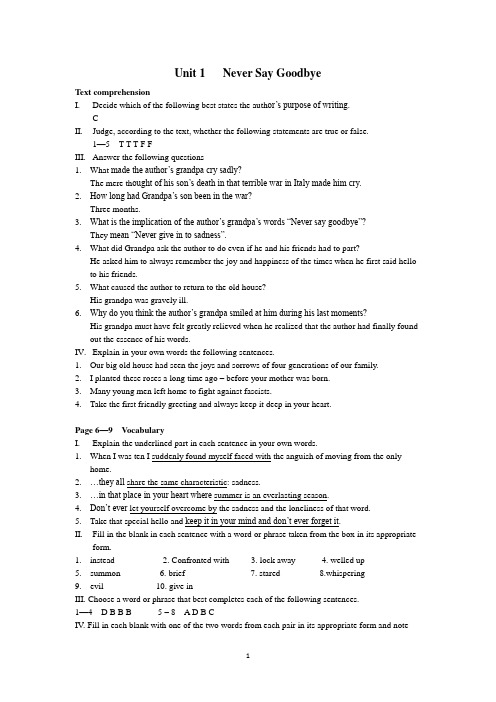
Unit 1 Never Say GoodbyeText comprehensionI.Decide which of the following best states the auth or’s purpose of writing.CII.Judge, according to the text, whether the following statements are true or false.1—5 T T T F FIII.Answer the following questions1.What made the author’s grandpa cry sadly?The mere th ought of his son’s death in that terrible war in Italy made him cry.2.How long had Grandpa’s son been in the war?Three months.3.What is the implication of the author’s grandpa’s words “Never say goodbye”?They mean “Never give in to sadness”.4.What did Grandpa ask the author to do even if he and his friends had to part?He asked him to always remember the joy and happiness of the times when he first said hello to his friends.5.What caused the author to return to the old house?His grandpa was gravely ill.6.Why do you think the author’s grandpa smiled at him during his last moments?His grandpa must have felt greatly relieved when he realized that the author had finally found out the essence of his words.IV.Explain in your own words the following sentences.1.Our big old house had seen the joys and sorrows of four generations of our family.2.I planted these roses a long time ago – before your mother was born.3.Many young men left home to fight against fascists.4.Take the first friendly greeting and always keep it deep in your heart.Page 6—9 VocabularyI.Explain the underlined part in each sentence in your own words.1.When I was ten I suddenly found myself faced with the anguish of moving from the onlyhome.2.…they all share the same characteristic: sadness.3.…in that place in your heart where summer is an everlasting season.4.Don’t ever let yourself overcome by the sadness and the loneliness of that word.5.Take that special hello and keep it in your mind and don’t ever forget it.II.Fill in the blank in each sentence with a word or phrase taken from the box in its appropriate form.1.instead2. Confronted with3. lock away4. welled up5. summon6. brief7. stared8.whispering9. evil 10. give inIII. Choose a word or phrase that best completes each of the following sentences.1—4 D B B B 5 – 8 A D B CIV. Fill in each blank with one of the two words from each pair in its appropriate form and notethe difference in meaning between them.1.shudder & shakea.shakingb. shudderedc. shakingd. shuddered2.answer & replya.answerb. replyc. replyd. answeredmon & generala.generalb. generalc. general; commond. common4.small & tinya.smallb. tinyc. tinyd. smallV.Give a synonym or an antonym of the word underlined in each sentence in thesense it is used.1.anguish: pain, grief, sorrow, agony2.softly: loudly, harshly, roughly3.sadness: sorrow, grief, dismay4.conspicuously: inconspicuously, unnoticeably5.tiny: small, little6.part: meet, gather7.gravely: seriously, severely, hopelessly8.brief: lengthy, longVI.Fill in the blank in each sentence with an appropriate form of the given capitalized word in brackets.1. industrial2. description3. suspicion4. assistant5. unemployed6. proof7. examination 8. FartherPage 10—12 Grammarplete the following sentences using the simple past, past progressive or pastperfect.1.were bathing; were looking; were playing2.was sitting; was reading3.was leaving; was; arrived; learned; had left; found; had used4.were playing; heard; hid; took5.was cycling; stepped; was going; managed; didn’t hit6.gave; thanked; said; had enjoyed; knew; had not read; were7.had played; reached; entered8.was running; struckplete the following passage with the proper form of the verbs given.left; spent; had been travelling; appeared; was; were crossing; could; arrived; was sleeping; stopped; came; were getting; was; had not arrived; would beIII.Correct the errors, where found, in the following sentences.1.talked → was talking2.√3.had remembered → remembered4.was working → had been working5.had resigned → resigned6.√7.√8.√IV.Fill in each blank with the proper form of the verb in brackets.1.take2. to play3. lifted4. barking5. played6.to say7. beaten8.bite; slither9. drop 10. lyingV.Rewrite the following sentences according to the example.1.Poor as/though he was, he was honest.2.Terrible as/though the storm, we continued our journey.3.Hard as/though he tried, he was unable to make much progress.4.Tired as/though I was, I went on working.5.Much as I would like to help you, I’m afraid I’m simply too busy at the moment.6.Much as I admired him as a writer, I do not like him as a man.7.Strong as/though he was, Tom couldn’t lift it.8.Bravely as/though they fought, they had no chance of winning.Page 13 TranslationI.Translate the following sentences into Chinese.1.我十岁那年,突然要搬家,从我唯一知道的家搬走,心中痛苦万分.2.我们似乎有许多不同的方式说再见,但它们都有一个共同之处, 那就是令人感到悲哀.3.有一天,一场可怕的战争爆发了,我的儿子,就像许许多多的儿子, 离乡背井与极大的邪恶战斗去了.4.我在自己的心灵深处搜寻那些构成我们友谊的特殊感情.II.Translate the following sentences into English, using the words and phrases given in brackets.1.He has prepared answers to the questions that he expects to confront during the interview.2.His sad story touched us so deeply that we nearly cried.3.The two of them are walking hand in hand along the riverbank, chatting and laughing.4.When he heard the exciting news, tears of joy welled up in his eyes.5.People from Shanghai can understand Suzhou dialect with ease, for Shanghai dialect andSuzhou dialect have much in common.6.Henry and his wife are looking into the possibility of buying a new house within three years.7.He finally gave in to his daughter’s repeated requests to further her education abroad.8.We locked all our valuables away before we went on holiday.9.Although we have parted from each other, I hope that we’ll remain good friends and that wewill care for and help each other just as we did in the past.10.At that critical moment, the army commander summoned all the officers to work out newstrategies and tactics which would make it possible to conquer the enemy.Integrated skillsI. DictationThroughout history / the basic unit of almost every human society / has been the family. / Members of the family live together / under the same roof. / They share the economic burdens oflife / as well as its joys. / The family head usually has considerable influence / in arranging marriages, / selecting careers / and determining all important moves and purchases / by any member of the family. / Particularly in conditions / where society or the state / does not give aid / and the responsibilities of the family are greater, / this large group / provides better protection / in times of economic or other emergency.II. Fill in each blank in the passage below with ONE word you think appropriate.ter2.push3.what4.puzzled5.custom6.because7.hosts8.visitor9.table10.howeverWritingSentence FragmentsRewrite the following sentence fragments to make complete sentence.1. Because we want to do something perfectly. (A dependent-word fragment)---a. We want to do something perfectly.---b. Sometimes we tend to put off what we can do today till tomorrow simply because we want to do something perfectly.2. For example, a strict control over the access to the secret data. (An added-detail fragment) ---a. For example, a strict control over the access to the secret data shouldn’t be absent.---b. For example, there should be a strict control over the access to the secret data.3. Being born and bred in a city. (An -ing fragment)---a. I was born and bred in a city.---b. Being born and bred in a city, I am interested in everything in the countryside.4. Those who can see opportunity and are prepared to take advantage of it. (Adependent-word fragment)---a. Those people can see opportunity and are prepared to take advantage of it.---b. Lucky people are those who can see opportunity and are prepared to take advantage of it.5. The dog ran around the yard. To find the ball. (A to fragment)---The dog ran around the yard to find the ball.6. Many unique animals live in Australia. Such as the kangaroo and the koala. (Anadded-detail fragment)---Many unique animals live in Australia, such as the kangaroo and the koala.7. “If only” is a great excuse. Especially if it’s something totally out of your control. (Anadded-detail fragment)---“If only” is a great excuse, especially if it’s something totally out of your control.8. You feel rewarded for your hard work. And get spiritual or sometimes material satisfaction.(A missing-subject fragment)---You feel rewarded for your hard work and get spiritual or sometimes material satisfaction.9. The bird flew through the air. Swooping and diving. (An -ing fragment)--- The bird flew through the air, swooping and diving.10. The moon hung in the sky. Like a brilliant silver disk. (An added-detail fragment)--- The moon hung in the sky, like a brilliant silver disk.ListeningGifts and CulturesPeople in all countries enjoy gifts. Sometimes the meanings are different in other cultures.A.Pre-listening activity.What kinds of gifts do you give when …1.you go to a friend’s wedding? Money.2.you visit a friend or stay with a family in another country? Food from your country.3.you celebrate a friend’s birthday? A cake.4.you go to a business meeting? A calendar.5.you want to give something to someone you love? Roses.B.Listen to the narrator. What gifts do people give on the following occasions? And why?1. An Australian girl is celebrating her 21st birthday.Gift: a key-shaped birthday cakeWhy? It means the girl is an adult and can come home at any time.2. An African couple is getting married.Gift: a cowWhy? It can bring good luck to the newly-weds.3.Korean boy is going to take his university entrance tests in a week.Gift: sticky rice candyWhy? It expresses the hope that the students will “stick to” the university.C. Listen to the conversations, which item is not a good gift? Cross it out. And then explain why it is not a good gift.1. China A. a handkerchief B. a big dinnerWhy not?Key: A. A handkerchief means goodbye.2. Argentina A. a tie B. a flower vaseWhy not?Key: A. A tie is too personal.3. Switzerland A. candy B. rosesWhy not?Key: B. Roses mean love and romance.4. Italy A. an even number of flowers B. an odd number of flowersWhy not?Key: A. Even numbers are unlucky.5. Japan A. a pen and pencil set B. a set of four pensWhy not?Key: B. “Four” sounds like the word for “death” in Japanese.TranscriptGifts and CulturesNarrator: In many countries, people give special gifts at certain times. Sometimes the customs seem unusual. For example, in Australia, a birthday cake for a 21-year-old is often shaped like akey. It means the person is an adult and can come home at any time. In parts of Africa, people give a cow as a wedding present, because they believe that a cow can bring good luck to the newly-weds. Before Korean students take university entrance tests, their friends give them sticky rice candy for luck. The friends hope that the students will pass the test and "stick to" the university. The following short conversations will tell you about different customs in China, Argentina, Switzerland, Italy and Japan.Number 1: ChinaWoman: Did I tell you I'm going to China?Man: China? Great.Woman: Yes. I'm going to Shanghai on business. I have to buy some gifts.Man: Good idea. What are you going to take?Woman: I was thinking of bringing some handkerchiefs. They're colorful, beautiful? also lightweight. I don't want to carry anything heavy.Man: Ah, I don't think you should give handkerchiefs. They aren't a good gift in Chinese culture.Woman: Why not?Man: A handkerchief is a symbol of saying goodbye.Woman: Saying goodbye?Man: Yeah, like when you're going away ... and people are crying, so they need a handkerchief. Actually, I've heard that one of the best things to give is a dinner -- not a present, but a big dinner. It's good for business.Number 2: ArgentinaWoman: This is interesting. Did you know that in Argentina you should never give clothing unless you know the person really well?Man: Don't give clothing? Why not?Woman: Clothing -- even things like ties -- are too personal. Only good friends give them. Man: Huh? I never thought of a tie as being personal ... just uncomfortable. What should you bring?Woman: I don't know. Maybe something for the house.Number 3: SwitzerlandMan: We're meeting Mr. Mertz and his wife for dinner. Maybe I should take flowers or something ... Yeah, I'll pick up some red roses.Woman: You'd better not give them roses. In Switzerland, they could be a symbol of love and romance.Man: Oh, I didn't know that.Woman: I think candy or chocolate might be better.Number 4: ItalyWoman: I'd like some flowers. Uh ... those. About ten, I guess.Man: Ma'am, I don't think you should give ten flowers. In Italy, even numbers -- 2, 4, 6, and so on -- are bad luck.Woman: Even numbers are bad luck? OK, I'll take nine flowers then.Number 5: JapanWoman: May I help you?Man: I'm going to stay with a family in Japan. I need to get something for them.Woman: Pen sets are always a good gift.Man: Oh, that's a good idea. Let's see ... There are sets with a pen and pencil ... and bigger sets with four pens.Woman: You said you're going to Japan?Man: Yeah.Woman: Don't give a set of four pens -- in fact, don't give four of anything.Man: Why not?Woman: The Japanese word for "four" sounds like the word for "death." It's bad luck.Man: Thanks for telling me. I'll take the pen and pencil set.Woman: Good choice. These sets make very good gifts. After all, pens write in any language! Man: Uh ... yeah. Right.。
综合教程1Unit 1Never say goodbye

有共同之处 have sth. in common
把目光移开转而凝视
The essay Main modes of writing: Narration Description Argumentation Exposition …
What type of writing is this essay?
How to develop a piece of narration?
Definition
It is to give an account of an event or a series of events. In its broadest sense, narrative writing includes stories, real or imaginary, biographies, histories, news items, and narrative poems.
Introduce Yourself
Write your ad without your name on it. Collect all the ads from the class and put them in a box. Have each person pick an ad, read it aloud, and guess who wrote it.
adj. 嘶哑的 • hoarse
v. 下跪 • kneel n. 门廊 • porch v. 发抖 • shudder v. 召集 • summon
回忆起来
手拉手
有共同之处 欢乐与悲伤 把…锁藏起来 涌上来
把目光移开转而凝视
bring back hand in hand
have sth. in common
综合英语教程Unit1-Never-Say-Goodbye讲解学习

say goodbye” D. To tell the story of his grandpa’s death.
Part divisionFra bibliotekPart1
Para.1-Para.4 The author found it hard to overcome the sadness as the moment of parting drew near. So his grandpa came to help.
Key elements in a narrative
Narrative
Context
Selection
of
Organization
details
Point of
view
Purpose
❖Try to locate the context of the essay. (when, where, who, what…)
5
After-class assignment
Pre-reading tasks
Main modes of writing: Narration Description Argumentation Exposition ……
What type of writing is this essay?
❖Whose point of view does the story take? What are its advantages and disadvantages?
❖Advantages: A first-person narrative may be more vivid and lifelike, because it gives the reader the impression that it is what the writer himself has seen or experienced.
综合教程1Unit 1 Never Say Goodbye

Unit 1Never Say Goodbye制作人: 张少林OBJECTIVES1.Learn 130 new words and expressions and understand difficult language points2.Grasp the main idea and structure of the texts3.Develop critical thinking ability through the discussions on the life philosophy of never saying goodbye and on a woman ’s courage when facing dangers4.Review English grammar: Seven Basic English sentence structures5.Phonetics trainingU1-B1Memorable Quotes Warming upBasic English sentence GrammarPronunciation PhoneticsText comprehension Structure and ideas Sentence explanation New words and expressionText learningCombine the noun and WritingReading Text II; Finishing exercisesAfter-class tasksProceduresMemorable Quotes Pre-reading questions Background information Watch & DiscussI. Warming up U1-B1Memorable QuotesI. Warming up U1-B1•The happiest moments of my life have been the few which I have passed at home in the bosom of my family.―Thomas Jefferson•Where we love is home. Home that our feet may leave, but not our hearts.―Olive Wendell Homestheyounger ones.II. TextLearningII. Text U1-B1This text is concerned with the author's recall of his most important and unforgettable experiences that came about when he was a child between 10 and 12. The text tells us that the author had learned from his grandfather the profound meaning of "Never say goodbye" and became strong-willed as a child.The text conveys the message that we should never give in to bitterness or sadness, that we should always be firm and strong-willed, and that we should always remember the joyful and happy events of life as well as our cherished friendship.1. What made the author’s grandpa cry sadly? (Paras.12)The mere thought of his son's death in that terrible war in Italy made him cry.2. How long had Grandpa’s son been in the war?•Three months.3. What is the implication of the author’s grandpa’s words “never say goodbye”? (Para1.13-20)•They mean "never give in to sadness" or "refuse to give in to sadness."II. Text learning _ Text comprehension U1-B1 4. What did Grandpa ask the author to do even if he and his friends had to part? (Para.13)He asked the author to always remember the joy and happiness of the times when he first said hello to his friends.II. Text learning _ Text comprehension U1-B15. What caused the author to return to the old house? (Paras.14-15)Grandpa's grave illness led the author to the old house.II. Text learning _ Text comprehension U1-B1 6. Why do you think the author’sgrandfather smiled at him during his last few minutes of life? (Para.20)Grandpa must have felt greatly relieved that the author had finally found out the essence of his words.II. Text learning _ Text comprehension U1-B1•Part 1: Paragraphs 1-4This text can be roughly divided into three parts. In the first part (Paras.1 to 4), the author brings up theproblem he was confronted with: he found it hard to overcome the sadness as the moment of parting drew near. So he turned to his grandpa for help.In the second part (Paras.5–13), the author’s grandpa, by narrating his sad experience of the loss of his eldest son during the war, illustrates how one can overcome the sad feeling resulting from the loss of someone dear to him by recalling not the moment of parting but the happy times spent together.II. Text learning _ Structure of the text U1-B1In the third part (Paras.14-20) by the way he behaved when confronted with another sadmoment ―the loss of his grandpa, the author shows us that he came to understand what his grandpa had taught him.Let’s listen to and read Part 1 of the text (Paras.1-4)Part 1II. Text learning _ Part 1U1-B1In the first part, the author brings up the problem he was confronted with: he found it hard to overcome the sadness as the moment of parting drew near.II. Text learning _ Part 1 U1-B1Main Idea of Part 1When I was ten I was suddenlyconfronted with the anguish of moving from the only home I had ever known .(L1, Para.1)Time adverbial clauseGerund phrase as object of “of”II. Text learning _ Part 1U1-B1Why was the author seized with the anguish of moving from his home?At the age of 10, I suddenly found myself faced with the great pain of going from the old residence to another place.confront v.be faced with and have to deal with II. Text learning _ Part 1 U1-B1e.g.The school was confronted with a reduced budget.The policeman confronted the driver with a summons.警察把传票送到司机面前。
综合英语第一册 unit1

Unit 1 Never Say Goodbye.I.Teaching PointsBy the end of this unit, students are supposed tograsp the author’s purpose of writing and make clear the structure of the whole passage through an intensive reading of Text 1 Never Say Goodbye.comprehend the topic sentences in Text 1 thoroughly and be able to paraphrase them.get a list of new words and structures and use them freely in conversation and writing.be aware of the cross-cultural differences in the social behavior of Giving Gifts.II.An integrated Analysis of Text 1 Never Say Goodbye.Topics for discussionWhat was your feeling when you left your parents for the first time and came here?Have your family ever moved from one place to another? If you have, how did you feel when you were going to be away from the old house forgood?Have you ever attended a funeral of some one you know very well? If you have, what were you thinking when you saw him for the last time?Write a letter to your imaginary child to be read on his or her eighteenth birthday. Describe the qualities that you hope he or she will have at this timeof life.HighlightsThe text is the author’s memory of the most important and unforgettabl e experiences when he was between 10 and 12. He had learned from hisgrandfather the profound meaning of “never say goodbye” and became firmand strong-willed as a child. The author wants to tell us that we shouldnever give in to sadness, that we should always be firm and strong-willed, and that we should always remember the joyful and happy events of lifeas well as our cherished friendship.Structural analysis of the text and language pointsThe passage can be divided into three parts.Part One: (Paragraphs 1-4) bringing up the problem the author was confronted with: it is hard to overcome the sadness as the moment of partingdrew near. So he turned to his grandpa for help.Para. 1: beginning of the story ---introducing the backgroundThe author was reluctant and bitterly sad to move away from his old homebecause it was the only home that he was ever known. His whole life,brief as it was, had been spend in that big old house, graceful touchedwith the laughter and tears of four generations.Para. 2-4: the implication of GOODBYE the author learned from hisgrandfather:being too final, too cold for friends to use; implying sadness andunhappiness. The grandfather wanted him to think of joyful and happyevents of life instead of feeling sad and miserable.Part Two: (Paragraphs 5-13) By narrating his sad experience of the loss of his eldest son during the war, the grandpa illustrates how one canovercome the sad feeling resulting from the loss of someone dear to him byrecalling not the moment of parting but the happy times spent together.Para. 5-9: the grandpa’s intention of saying “it isn’t just the roses that arebeautiful; it is that special place in your heart that makes them so.”The grandfather want to:1)1)tell the author a true story of related to the rose bush and hoped toenable him to feel with his heart how beautiful those roses were!2)2)reveal his special associations with the roses and with his sayinggoodbye to his son, as well as to disclose the root cause of his advice notto say goodbye to one’s relatives and friends.Para 10-13: The telling of the story related to the rosebush. The message of the text is conveyed in Para. 13The grandfather want the author:1)1)never to give in to the sadness and the loneliness of the wordgoodbye.2)2)remember instead the joy and happiness of those times when he firstsay hello to a friend.3)3)take that special hello and lock it away with him---in that place in hisheart where summer is an always time.4)4)Reach deep within him and recall that first hello when he and hisfriends must part from each other.Part Three: (Para. 14-20): by the way he behaved when confronted with another sad moment---the loss of his grandpa, the author shows us thathe came to understand what his grandpa had taught him.The parting between the author and his grandfather was so cheerful andpleasant as if they were old friends greeting each other, which showed thathis grandfather adopted an optimistic attitude towards his own death and thatthe author became so strong-willed as not to give in to the sadness.When the author was told that his grandfather had died, he remainedperfectly calm and composed instead of being plunged into sadness.Rememberin g his grandpa’s words, he reached deep within him for thosespecial feelings that had made up their friendship. Suddenly and truly, herealized what his grandfather had meant about never saying goodbye---aboutrefusing to give in to the sadness.nguage pointsConfront:1) be faced with and have to deal withE.g. The actress was confronted by large group of reporters as she left thestage door2)force to deal with or accept the truth of; bring face to face withE.g. When the police confronted her with the evidence, she confessed she wasguilty.Touched with the laughter and tears of four generations:touched with the happiness and bitterness of four generations. The sentence implies that “…the house which had seen and/witnessed the joys and sorrows ofthe four generations of my family.”touch: have an effect on one’s feelings; to cause one to feel pity, sympathy, etc.E.g. His sad story so touched us that we nearly cried.* be touched with: have a certain amount of qualityE.g. Her hair is touched with gray.Well:(of liquid) flow or start to flowE.g. Blood welled (out) form the cut.She was so moved that tears welled (up, forth, out)in her eyes.Linguistic Knowledge:Homonymy: the same phonological structure possessing several unrelated senses.E.g. well & well bank(sloping side of a river) & bank(a financialinstitution)花钱&开花Polysemy : the same phonological structure possessing a set of different but related meaning.E.g. hook 1) a curved material, esp. metal, for holding, catching orsuspending sth. 2) a sharp bend or angle in a geological formation.3)short for fishhook. 4)(Am. E) something that attracts or isintended to be a attraction;……Rest on/upon1)lean on; to be supported by2)(esp. of a proof, argument, etc.) be based on; be grounded on; depend onE.g. Your argument rests on a statement than cannot be proved.Through one’s tears:With tears in one’s eyes; while shedding tearsThrough: among or between the parts or members ofE.g. I searched through my papers for the missing documents.Stare1) look steadily for a long time, esp. in great surprise or shockE.g. He sat staring into space, thinking deeply.2) be very plain to see; to be obviousE.g. The lies in the report stared out at us from every paragraph.* stare off: stare away; to move one’s eyesWhisper:1) speak or say very quietly so that only a person cloze by can hearE.g. She whispered a warning to me and then disappeared.2) (of the wind, etc) make a soft soundE.g. The leaves of the trees were whispering in the wind.Before your mother was even a dream:before you mother was born / before we thought of having a daughter.Pick:1) take what one likes or considers best, or more suitable from a group.E.g. He has been picked to head the planning committee.2) gather; pull or break off (part of a plant) from a tree or a plantE.g. He picked some roses and gave them to his girlfriend.3) take up or remove something separately or bit by bit using the fingers, abeak, a pointed instrument, etc.The dog picked the bone clean.Lock it away within youFasten it firmly in your mind; imprint it on your mind; bear it in your mind and never forget it.…in that place in your heart where summer is an always time.In that place in your heart where there is always sunlight and warmth. / which is always filled with joy and happiness. Here SUMMER is a metaphor.“Always” here is used by the Grandpa as an adjective, which revealed that he was not well-educated. *Sociolinguistic knowledge: Your accent betrays you. IV. Questions for considerationStudents are required to preview the text with the following two questions:What is the text concerned with?What is the message of the text?V. Main ideas of Text 2The Dinner Party, one of the best known short stories of Mona Gardner, takes place in India earlier last century, when India was still a colony ruled by Great Britain. At the very beginning, there is a disagreement between the colonel and a young girl as to whether women are still easy to be scared. Then a snake came into the room, the hostess, with the help of an American, escaped the danger of a possible attack by the cobra. In the story, both the man and the woman demonstrated the marvelous quality of self-controlA topic for discussionGenerally speaking, which sex do you think is braver? Give some details to support your idea.。
综合教程I 课文分析Unit1 Never Say Goodbye

Main idea
1. What is the main idea of the text?
Detailed reading
confront: vt. 1) be faced with have to deal with
e.g. The actress was confronted by a large group of reporters as she left the stage door. Whenever we are confronted with any difficulties, we shouldn’t give up what we are doing.
Explanation: “brief as it was”: In a formal style, as can be used in a special word order to mean although. The construction suggests a very emphatic contrast.
ten,
When the
2-4
final day
come
Event
The author was to leave his big old house.
The author was anguish about the move. His grandfather advised him not to use the word “goodbye” to friends, for it implied sadness.
英语综合教程第一册课文及解释
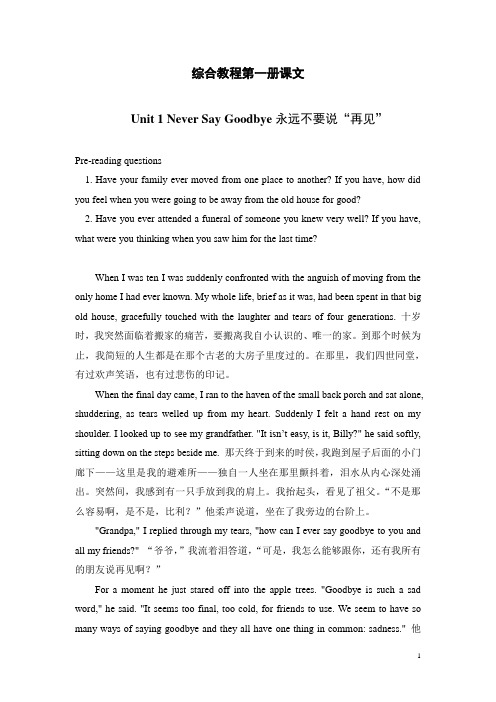
综合教程第一册课文Unit 1 Never Say Goodbye永远不要说“再见”Pre-reading questions1. Have your family ever moved from one place to another? If you have, how did you feel when you were going to be away from the old house for good?2. Have you ever attended a funeral of someone you knew very well? If you have, what were you thinking when you saw him for the last time?When I was ten I was suddenly confronted with the anguish of moving from the only home I had ever known. My whole life, brief as it was, had been spent in that big old house, gracefully touched with the laughter and tears of four generations.十岁时,我突然面临着搬家的痛苦,要搬离我自小认识的、唯一的家。
到那个时候为止,我简短的人生都是在那个古老的大房子里度过的。
在那里,我们四世同堂,有过欢声笑语,也有过悲伤的印记。
When the final day came, I ran to the haven of the small back porch and sat alone, shuddering, as tears welled up from my heart. Suddenly I felt a hand rest on my shou lder. I looked up to see my grandfather. "It isn’t easy, is it, Billy?" he said softly, sitting down on the steps beside me.那天终于到来的时侯,我跑到屋子后面的小门廊下——这里是我的避难所——独自一人坐在那里颤抖着,泪水从内心深处涌出。
综合英语第一册Unit1 NEVER SAY GOODBYE
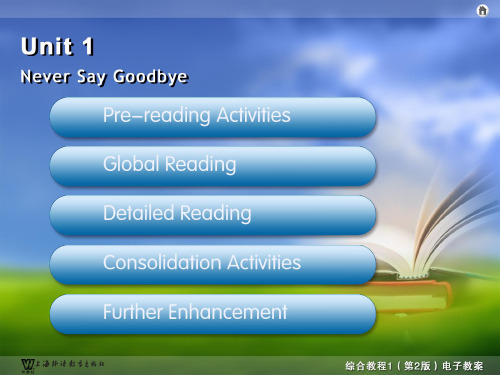
Reading aloud
Cultural information
Audiovisual supplement
Reading aloud
Cultural information
Audiovisual supplement
Mom:
There it is. Pretty much … how I remember it! I was younger than you last time I was here, Simon. Mallory: Well … it’s … big. Simon: Yes! So I can get bigger pets here, right, Mom? Mom: Sure, get a cow! Get a whole flock! Simon: Herd. Mom: That, too. What do you think, Jared? ... Jared? ... OK, here we go! Simon: It’s OK, Mr. Tibbs. It’s OK. … Oh, it has that old people smell. … It’s just an observation, not a judgment.
1. When I was ten / I was suddenly confronted with the anguish of moving from the only home / I had ever known. 2. ―It isn’t easy, / is it, Billy?‖ / he said softly, / sitting down on the steps beside me. 3. I was standing by his rosebush / when an uncle came to tell me / that my grandfather had died.
大学综合英语教程1 第1到10单元课后题,附带翻译题答案。精编版
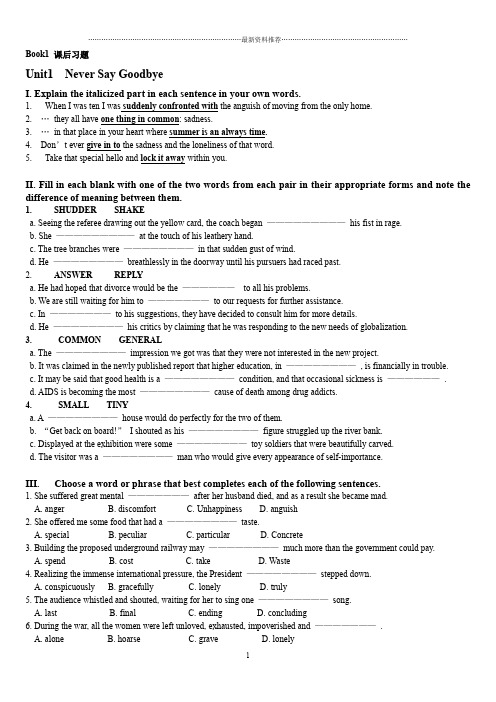
Book1 课后习题Unit1 Never Say GoodbyeI. Explain the italicized part in each sentence in your own words.1. When I was ten I was suddenly confronted with the anguish of moving from the only home.2. …they all have one thing in common: sadness.3. …in that place in your heart where summer is an always time.4. Don’t ever give in to the sadness and the loneliness of that word.5. Take that special hello and lock it away within you.II. Fill in each blank with one of the two words from each pair in their appropriate forms and note the difference of meaning between them.1. SHUDDER SHAKEa. Seeing the referee drawing out the yellow card, the coach began —————————his fist in rage.b. She —————————at the touch of his leathery hand.c. The tree branches were ————————in that sudden gust of wind.d. He ————————breathlessly in the doorway until his pursuers had raced past.2.ANSWER REPLYa. He had hoped that divorce would be the ——————to all his problems.b. We are still waiting for him to ———————to our requests for further assistance.c. In ———————to his suggestions, they have decided to consult him for more details.d. He ————————his critics by claiming that he was responding to the new needs of globalization.3. COMMON GENERALa. The ————————impression we got was that they were not interested in the new project.b. It was claimed in the newly published report that higher education, in ————————, is financially in trouble.c. It may be said that good health is a ————————condition, and that occasional sickness is ——————.d. AIDS is becoming the most ————————cause of death among drug addicts.4. SMALL TINYa. A ————————house would do perfectly for the two of them.b. “Get back on board!”I shouted as his ————————figure struggled up the river bank.c. Displayed at the exhibition were some ————————toy soldiers that were beautifully carved.d. The visitor was a ————————man who would give every appearance of self-importance.III. Choose a word or phrase that best completes each of the following sentences.1. She suffered great mental ———————after her husband died, and as a result she became mad.A. angerB. discomfortC. UnhappinessD. anguish2. She offered me some food that had a ————————taste.A. specialB. peculiarC. particularD. Concrete3. Building the proposed underground railway may ————————much more than the government could pay.A. spendB. costC. takeD. Waste4. Realizing the immense international pressure, the President ————————stepped down.A. conspicuouslyB. gracefullyC. lonelyD. truly5. The audience whistled and shouted, waiting for her to sing one ————————song.A. lastB. finalC. endingD. concluding6. During the war, all the women were left unloved, exhausted, impoverished and ———————.A. aloneB. hoarseC. graveD. lonely7. He was put into prison, but he never ———————, and continued his fight from behind the bars.A. gave upB. give inC. stoppedD. retreated8. His high school report ————————that he was brilliant in all science subjects.A. believedB. noticedC. notedD. decidedIV. Fill in the blank in each sentence with a word or phrase taken from the box in its appropriate form.lock away summon instead stare whisper give in evilconfront with well up gently brief pull1.The minister didn’t make any comments on their own human rights problems; he said————————that we were to do more on this issue.2. ————the sight of the poor, the sick and the unemployed, the government had no way out but to decide to reform.3. Take good care to————————your jewelry before going away on holiday.4. Strong feelings————————within them.5. He tried to————————from his memory what he knew of his former neighbor.6. The Secretary of State said that the war was going to be————————but decisive.7. I looked hard at him, while he————————dully back at me.8. A voice seemed to be————————in her mind, telling her to be brave.9. If a man speaks or acts with a(n) ————————thought, pain follows him.10. If you always————————to others you will end up feeling depressed.V. Fill in the blank in each sentence with an appropriate form of the given capitalized word in the bracket.Example: The bloodstain on her dress was very —————————.( NOTICE )Answer: The bloodstain on her dress was very noticeable.1. Nobody wanted to live in the————————part of the town. ( INDUSTRY )2. The police asked him to give a————————of the suitcase he had lost. ( DESCRIBE )3. He had no————————that he was being watched.( SUSPECT )4. This is Alexandra, my personal———————— .(ASSIST)5. Although some of my work-mates quickly found new jobs after the factory closed down, my brother and I were————————for several months. (EMPLOY)6. Although I was positive that the girl had stolen my ring, I could not find any————————.(PROVE)7,With very high scores in the entrance ----------,he succeeded in entering the world famous university( examine)8,Completely exhausted and utterly staved after a long days march,the soldiers could hardly walk any----------(far)Translation exercises1. 他为这次面试中可能面对的问题准备好了答案。
- 1、下载文档前请自行甄别文档内容的完整性,平台不提供额外的编辑、内容补充、找答案等附加服务。
- 2、"仅部分预览"的文档,不可在线预览部分如存在完整性等问题,可反馈申请退款(可完整预览的文档不适用该条件!)。
- 3、如文档侵犯您的权益,请联系客服反馈,我们会尽快为您处理(人工客服工作时间:9:00-18:30)。
Unit 1Teaching Objectives1. Phonetics: correct pronunciation, stress and sense groups2. Oral activities: role-play, topic discussion3. Text comprehension: the main idea of the texts and the key language points4.Writing practice: the descriptive writing skills and rewritingI.Background Information of Text I/daudet.doc.The students may be very familiar with this passage, the last several lines of The Last Lesson by Alphonse Daudet. It described the scene of parting. The author was too sad to say good-bye. He only made a gesture.When will you say good-bye? How did you feel?II. Language Points of Text I1.confront(1) be faced with and have to deal withThe actress was confronted by a large group of reporters as she left the stage door.(2) force to deal with or accept the truth of; bring face to face withWhen the police confronted her with the evidence, she confessed she was guilty.2.anguish: very great pain and suffering, esp. of the mindShe was in anguish over her missing child.The unspeakable anguish wrung her heart.3.brief as it wasthough it was short/brief; although it lasted a short timeHot as it was, they went out.4.gracefully(1) in an attractively and effortlessly fine and smooth mannerAlready in her fifties, she danced gracefully on the stage last night, attracting a large audience, who clapped their hands several times.(2) in a way that shows willingness to behave fairly and honorablyHe stepped on my left foot when we hurried into the elevator shaft, and immediately he apologized to me gracefully.graceful: adj.5.touched with the laughter and tears of four generationstouched with the happiness and bitterness of four generationstouch:(1) put one's hand onto sth. or sb. elseIn darkness, she felt someone touching her face.Visitors are requested not to touch the paintings.(2) have an effect on one's feelings; to cause one to feel pity, sympathy, etc.His sad story so touched us that we nearly cried.By the way, the phrase "be touched with" usually means "have a certain amount of a quality." For example:Her hair is touched with grey.The boy is touched with genius.In this sentence, however, the phrase is not exactly used in this meaning. It implies that "...the house which had seen/witnessed the joys and sorrows of the four generations of my family." 6. haven : a place of calm and safetyThe school library is a little haven of peace and quiet.As a tourists' haven, the small hotel is a home away from home.7.porch: a roofed entrance built out from a house or church; verandaShe sat in the shade on the porch.8.shudder: shake uncontrollably for a moment, esp. from fear, cold, or dislikeShe shuddered at the sight of the dead body.I shudder to think how big the bill will be.9.well: (of liquid) flow or start to flowBlood welled (out) from the cut.She was so moved that tears welled (up, forth, out) in her eyes.10. rest on/upon(1) lean on; to be supported byThe bridge rests on stone arches.The girl's head rested on her hands.(2) (esp. of a proof, argument, etc. ) be based on; be grounded on; depend onYour argument rests on a statement that can't be proved.We have tried everything; now it all rests on him.11.through my tears : with tears in my eyes; while shedding tearsthrough(1) in at one side, end, or surface of something and out at the otherWater flows through this pipe. He pushed his way through the crowd to the door.(2)among or between the parts or members ofThe monkeys swung through the trees.I searched through my papers for the missing documents.12. stare(1)look steadily for a long time, e. g. in great surprise or shockHe sat staring into space, thinking deeply.She stared at the letter in disbelief.(2) be very plain to see; to be obviousThe lies in the report stared out at us from every paragraph.stare off: stare away; to move one's eyes from a point nearby to a farther place and fix them on it or look at it steadily13. in common: having the same interests, attitudes, etc.The boy and the girl have much in common in personality.14. look into: investigate; examine the meaning or cause ofThe police have received some complaints; now they are looking into them.This is a report that looks into the causes of unemployment.15. gently: in a manner or way that is not rough, violent, or severeShe gently brushed the baby's hair."Don't cry," he said gently.16. whisper(1)speak or say very quietly so that only a person close by can hearThe children were whispering in the corner.She whispered a warning to me and then disappeared.(2)(of the wind, leaves, etc. ) make a soft soundThe wind was whispering in the roof.The leaves of the trees were whispering in the wind.17. hand in hand '(1)holding each other's hand (usually with the left hand of one in the right hand of the other)The elderly couple are walking homeward hand in hand. The heads of states are standing hand in hand, posing for a picture.(2)happening together and closely connectedDirt and disease go hand in hand.Theory and practice must go hand in hand.shoulder to shoulderThey were standing shoulder to shoulder.neck and neckShe was at least running neck and neck in the competition.18. rosebush : a bush of roses .There are very beautiful rosebushes in his garden.The young lovers are fascinated by the rosebushes in the park.19. conspicuously : in a way that is noticeable or easily seen; in an attractive mannerThe magazine contains conspicuously attractive advertisements.The posters on the walls around are conspicuously eye-catching.Conspicuous: adj.Conspicuity: conspicuousness n.20. before your mother was even a dream : before your mother was born / before we thought ofhaving a daughter21. pick(1)take what one likes or considers best, or most suitable from a groupThe students have to pick three courses from a list of fifteen.She has been picked to head the planning committee.(2)gather; pull or break off (part of a plant) from a tree or plantShe picked some flowers from her garden.He picked some roses and gave them to his girlfriend.(3) take up or remove something separately or bit by bit using the fingers, a beak, a pointedinstrument, etc.The vultures were picking the meat from the carcass.The dog picked the bone clean.22. hoarse: (of a voice) rough-sounding, as though the surface of the throat is rougher than usual, e. g.when the speaker has a sore throatMy voice has become hoarse since I began to have a sore throat.When the football match was going on, we cheered for our team and we shouted and shouteduntil our voices went hoarse.23. evil: a great wickedness or misfortuneWe must conquer the twin evils of disease and poverty.The greed for money is the root of all evils.24. tiny: extremely small; very smallBeing a small woman, she gave birth to a tiny baby.25. give in to: give way; surrender; allow oneself to be beatenThe two boys fought until one gave in to the other.Don't give in to their demands, which know no bounds.26. lock it away within you : fasten it firmly in your mind; imprint it on your mind; bear it in your mind and never forget itlock(1) fasten with a lockLock the door after you.The door won't lock.(2) put in a safe place and lock the entrance or openingShe locked her jewels in a safe.lock away: lock up; put in a safe place and fasten the lockShe had locked her money away before she went away on holiday, but when shereturned home, she found that all her money was gone.27. ... in that place in your heart where summer is an always ti me. … in that place in your heart where there is always sunlight and warmth. / ... in that place in your heart which is always filled with joy and happiness. Here, it is easy to see that "where summer is an always time" is metaphorical. And the word "always," which is always an adverb, is used as an adjective here. Maybe this reveals that the old man was not well-educated.28. part : (to cause to) separate or be no longer togetherI hope that we part as friends ( = remain friends as we part).The war parted many men from their families.29. I want you to reach deep within you and bring back that first hello : I want you to get to the bottom of your heart and recall that first hello. / I want you to think deeply and recall the friendly occasions on which you met your friends and said hello to them for the first time.30. bring back(1) cause to returnAll library books must be brought back before the end of the term.If I go with you in your car, will you be able to bring me back?(2) obtain and return withHe brought some beautiful carpets back from Iran. When you go to the post office,will you bring back some stamps for me?(3) cause to return to the mindHearing the song brings back some happy memories.Seeing her again brought all sweet memories back.31. gravely : in a way showing great seriousness; (of manner) in a state of being serious and solemn" The situation poses a serious threat to peace," said the ambassador gravely.32. beloved :(a person who is) dearly lovedIt is a gift from my beloved.His beloved wife died.33. summon: order officially to comeThe guards were summoned into the presence of the Queen.34. when it came to my turn: when it was my turn to say goodbyeturn(1)an act of turning; a single movement completely round a fixed pointDon't pull the handle; give it a turn.Give the key a turn, and the lock will open.(2) a point of change in timeYoung people at the turn of the century must draw up a mighty blueprint.35. note(1) notice and remember; observeNote the way this writer uses the present tense for dramatic effect.Please note that this bill must be paid within 10 days.(2) remark; call attention toThe report notes with approval the government's efforts to resolve this problem.36. breathe(1) take air, gas, etc. into the lungs and send it out againThe doctor told me to breathe in deeply and then to breathe out slowly. I will remember the day as long as I breathe.(2) whisper; say softlyHe breathed words of love into her ear. She breathed a sigh of relief when she heard that she had passed the exam.III. Organization of Text IThe text is the author's recall of the most important and unforgettable experiences that came about when he was between 10 and 12. He had learned from his grandfather the profound meaning of "Never say goodbye" and became firm and strong-willed as a child. The author wants to tell us that we should never give in to sadness, that we should always be firm and strong-willed, and that weshould always remember the joyful and happy events of life as well as our cherished friendship.Part I (Paragraphs 1 to 4)The author brings up the problem he was confronted with: he found it hard to overcome the sadness as the moment of parting drew near. So he turned to his grandpa for help.Part II (Paragraphs 5 to 13)The author’s grandpa, by narrating his sad experience of the loss of his eldest son during the war, illustrates how one can overcome the sad feeling resulting from the loss of someone dear to him by recalling not the moment of parting but the happy times spent together.Part III (Paragraphs 14 to 20)By the way he behaved when confronted with another sad moment—the loss of his grandpa, the author shows us that he came to understand what his grandpa had taught him.IV. Writing skill of this text---description of eyesauthor grandfatherlooked up to see my grandfather stared off into the apple trees continued to look into his (grandfather)facelooked at the flower (his eyes) met mine againsaw my grandfather’s tears, never seenhim cry before(his eyes) were closed(his eyes) slowly opened(his eyes) closed againWriting practiceStudent’s book P11---- rewrite the sentencesV.Oral ActivitiesFriendship encourages people while sorrow doesn’t.VI.Text IIQuestions for discussion1.On what topic did the colonel and the young girl disagree?2.What kind of expression did the American notice came over the face of the hostess?3.what did the American realize the bowl of milk meant?4.What did the American realize was happening?5.How did the American react to the crisis?6.What did the American say to make sure that everyone remained perfectly still?7.Why did the hostess’s face light up with a faint smile?8.What qualities did both the American and the hostess display?VII. DictationSpelling1.anguish2.generation3.porch4.shudder5.whisper6.conspicuously7.hoarse8.gravely9.summon10.loneliness11.crisisernment13.haven14.confront15.terrible16.kneelPassageThroughout history the basic unit of almost every human society/ has been the family. /The members of the family live together/ under the same roof. /They share the economic burdens of life /as well as its affectional joys. /The family head usually has considerable influence/ in arranging marriages, /selecting careers and determining all important moves and purchase/ by any member of the family./ Particularly in conditions /where society or the state does not give aid/ and where consequently the responsibilities of the family are greater, /this large group provides better protection /in times of economic or other emergency./VII.After-class reading sources1. The Last Lesson/daudet.doc.2. Unwillingly on HolidayA New English Course Book 3—P16。
